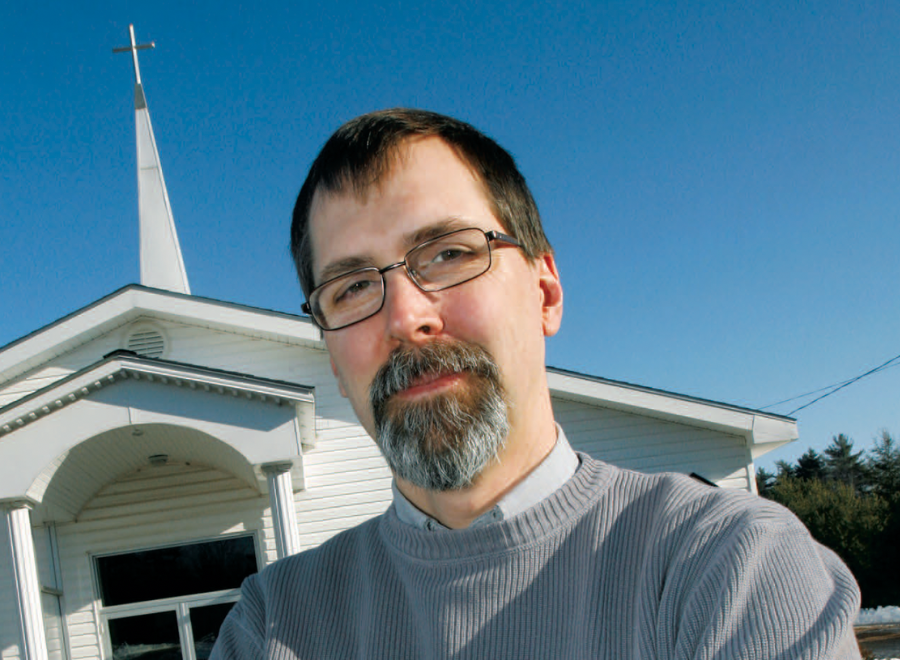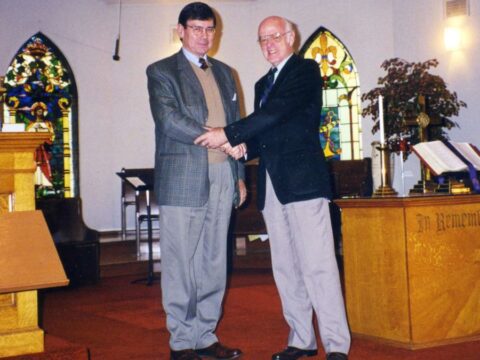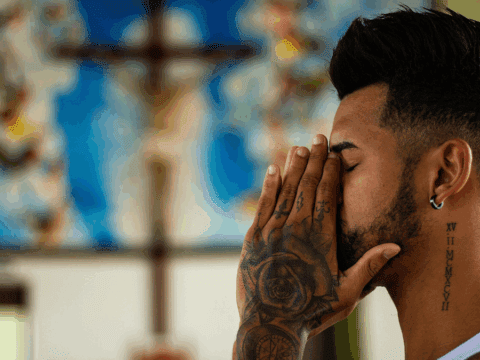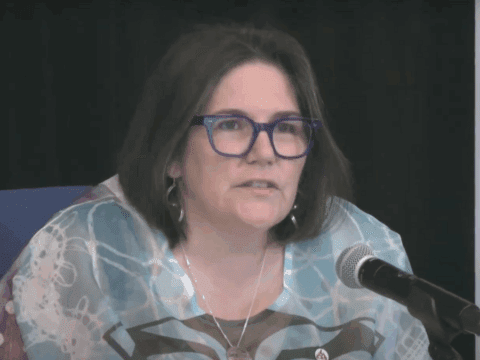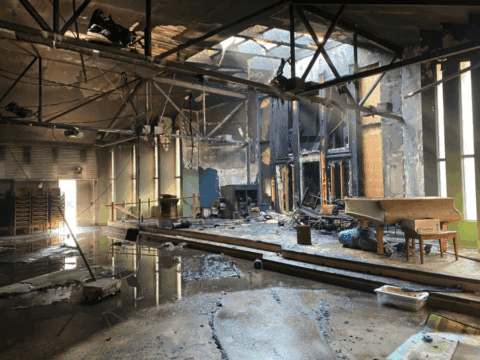When diaconal ministers hold their biennial national gathering next month, they will take a close look at the United Church’s order of ministry and their place in it.
Many of them, though, say they are already out of the loop when the General Council makes policies and decisions about ministry. Add to that long-standing suspicions about being perceived as second-class clergy, and you have the ingredients for simmering discontent. “I won’t come right out and say the present system is antagonistic toward diaconal ministry,” says David Hewitt, a diaconal minister serving the New Minas, N.S. pastoral charge. “It’s just been very hard to figure out how to connect with it.”
You may unsubscribe from any of our newsletters at any time.
Against the backdrop of a pool of trained ministers that will be cut in half through retirements over the next decade, five General Council task groups have been looking at various aspects of ministry ranging from demographics and counselling to discipline and the meaning of ministry. But only one of those task groups includes a diaconal minister.
There are also no diaconal ministers on the permanent committee on Ministry and Employment Policies and Services, its staff or — by extension — many staff subcommittees working on issues including recruitment, candidacy, admissions and lay ministry.
According to diaconal ministers, the church may be missing out on their unique approach to ministry, a leadership style retired diaconal minister Betty Marlin of Edmonton says is “empowering,” and one that “keeps the justice perspective in mission, the reason that the church is alive.”
With roots in the deaconess movement of another era, and aware of a long history of marginalization, diaconal ministers say they aren’t surprised at the exclusion. But after having much more influence through General Council staff and structures during the 1990s, many are annoyed.
Marlin, who has worked in congregations, in Conference, in colleges and overseas, says, “Throughout my ministry I’ve been told by people, ‘You could be a real minister.’ And I’ve always told them, ‘I am a real minister, thank you.’”
With 149 ministers serving congregations or special ministries, diaconal ministers represent less than seven percent of active ordered ministers. They are commissioned to education, service and pastoral care and aren’t called “Reverend,” the honorific title that the vast majority of ministers take on when they are ordained to word, sacrament and pastoral care. If an ordained and diaconal minister work as a team, the ordained minister will usually be in charge of worship while the diaconal minister handles Christian education and outreach.
Diaconal ministers are trained for work that emphasizes education, community development and social justice. Four-year courses that let candidates live and work in their home communities are offered at the Anglican-United Centre for Christian Studies in Winnipeg or through Native ministry training centres in Ontario and Manitoba.
In today’s changing congregations, says Eric Tusz-King of Sackville, N.B., a diaconal minister and former Maritime Conference staffer who now manages an environmental building co-operative, diaconal-style leadership skills are needed more than ever. As congregations shrink, amalgamate, close or change gears, he says, diaconals’ training helps them “assess needs and develop a plan of action or education to address those needs If that’s not what’s needed right now in the church, I don’t know what is.”
Because diaconal ministers officially need permission from Presbytery to administer sacraments, their roles traditionally didn’t include a steady diet of worship. That’s changing. “There’s been a pretty significant blending and fuzzying of roles,” says Hewitt. More than two decades after being commissioned, he now works as a solo minister on a pastoral charge doing worship, sacraments, education and pastoral care, “and most of my colleagues are in the same position.”
Some congregations don’t even notice the difference, says Caryn Douglas, past principal of the Centre for Christian Studies. “I was just their minister.” Other congregations and church people see diaconal ministry as inferior.
Ted Dodd, who is on staff at the Centre and the only person in the United Church to move from ordained to diaconal ministry, says, “The perception is that it is second-class, not as good, and there’s a lot of suspicion around it.”
The Centre’s practical approach — differing from the more academic agenda of most theological colleges — may account for some skepticism or put-downs. But because diaconal ministry remains dominated by women, Douglas blames a mix of sexism and clericalism.
Certainly that has been the case in the past. The United Church Training School, the Centre’s predecessor, was known colloquially as the “angel factory.” Presiding at tea was part of the educational agenda in the 1950s and ’60s. (“I failed miserably,” says Marlin.)
In the 1980s and ’90s, feminist theology upset the social teakettle and helped to mould the Centre for Christian Studies into the place it is today — where both women and men learn how to “empower others to use their gifts” and “enable change towards social justice” while working in “transformative ministry.”
Dodd says he chose diaconal ministry because of a commitment to “finding meaning through connection with life and a broken world.” He just gets frustrated having to explain it again and again.
Diaconal ministers have the added distress of looking back on a not-so-distant past when they also had more institutional influence.
During the 1980s and ’90s, a national committee on diaconal ministry commanded at least part-time staff support in the former Division of Ministry Personnel and Education. Diaconal ministers held several influential staff positions, including Virginia Coleman, who was General Council’s general secretary for eight years, until 2002.
In 1995, seven diaconal ministers held staff positions in the General Council and Conference offices. About a decade later, when the moderator mistakenly called diaconal ministers “commissioned ministers” in a widely circulated video, there were no diaconal ministers in the General Council office to correct him. Only three diaconal ministers hold Conference staff positions today.
The national diaconal committee and its staff support were lost in General Council restructuring about seven years ago. New national committee structures and a new nominations process may account for reduced diaconal representation. General Council nominations committee chair Paul Stott says diaconal ministers may simply “have to beat the bushes among their membership” to find more nominees for positions.
General Council’s program co-ordinator for committee member services acknowledges recent membership requests from diaconal ministers, but puts the onus back on them to increase nomination efforts. General Council openings for volunteers are posted on the church’s website and candidates can nominate themselves or be nominated by others. “It’s a change in culture,” says Stott of the new procedure. “We’re getting there but we’re not there yet.”
With or without a diaconal member, though, a General Council task force on the meaning of ministry is sure to get their input. Diaconal ministers’ groups meet regularly and maintain a tight network. And with or without more understanding from their church, diaconal ministers continue to graduate from the Centre for Christian Studies and Native training centres to serve the church.
About 70 grads from the Centre alone during the last decade means diaconal ministers are nowhere near extinction. They expect change — after all, managing it is part of their ministry. But diaconal ministers also hope to be part of the process.
“I understand some of the push to make everything more simple,” says Lori Crocker, a diaconal minister in team ministry at Trinity United in New Glasgow, N.S. “We have all these categories of ministry, and at the top of the Sunday bulletin we say that the people of the congregation are all ministers.
“I think these ongoing discussions of ministry are very important. But we need to have all the voices at the table.”
***
This story first appeared in The United Church Observer’s March 2009 issue with the title “Diaconal discontent.”

